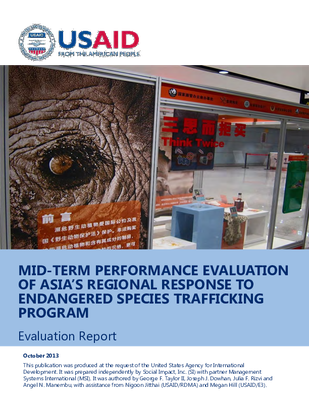Mid-Term Performance Evaluation of Asia’s Regional Response to Endangered Species Trafficking (ARREST) Program

This report is a mid-term performance evaluation of Asia’s Regional Response to Endangered Species Trafficking (ARREST), authored by MSI, and used “a mixed-methods evaluation design that combined qualitative and quantitative methods of data collection: document review, key informant interviews, and a survey.”
Key Points in Document:
- This report is a mid-term performance evaluation of Asia’s Regional Response to Endangered Species Trafficking (ARREST), authored by MSI, and used “a mixed-methods evaluation design that combined qualitative and quantitative methods of data collection: document review, key informant interviews, and a survey.”
- ARREST is a USAID program that “promotes a three-pronged approach to curb wildlife trafficking through: (1) reduction in consumption of endangered species in key markets in Asia by reducing consumer demand; (2) reduction in poaching and trafficking of endangered species across Asia by strengthening law enforcement capacity; and (3) continuation and sustainability of these positive trends beyond the life of the program by strengthening and sustaining regional learning networks and partnerships.”
- The evaluation includes an overview of the ARREST program, evaluation methodology, and findings, conclusions, and recommendations for each of the three “prongs” of the project (demand reduction, law enforcement capacity building, and sustainability, partnerships, and learning).
- Conclusions of the evaluation include: (1) demand reduction is a long-term activity, and it is not possible to measure demand shifts attributable to the project during the project period, (2) law enforcement capacity building progressed well at the time of the evaluation, though in some countries forward momentum has been stalled by a lack of support by their governments, understaffing, and budget limitations, (3) “individual states cannot be expected to solve the problems of transnational wildlife crimes and threats to indigenous species without engaging the support of neighboring countries.”
Related Learning Questions:
- How should target audiences and actions be selected for capacity building for CWT enforcement?
- What are the attributes of institutions that maintain and improve competencies over time?
- Under what conditions are different capacity building approaches (e.g., training, mentoring, peer-to-peer exchanges, etc.) and implementing partner types (NGO, gov. agency, inter-gov institution) most appropriate?
Citation: Social Impact Inc. Mid-Term Performance Evaluation of Asia’s Regional Response to Endangered Species Trafficking (ARREST) Program. Washington, DC; 2013.

